An Oklahoma death row inmate was just minutes away from being executed when he was granted clemency on Thursday.
Tremane Wood, 46, was set to receive lethal injection at the Oklahoma State Penitentiary at 10am for the murder of 19-year-old Ronnie Wipf in 2002, but at 10.01am Oklahoma Governor Kevin Stitt announced he was granting the inmate clemency, The Oklahoman reports.
It was just the second time in Stitt’s nearly seven years as governor that he has granted clemency to a death row inmate.
‘After a thorough review of the facts and prayerful consideration, I have chosen to accept the Pardon and Parole Board´s recommendation to commute Tremane Wood´s sentence to life without parole,’ the governor said in a statement.
‘This action reflects the same punishment his brother received for their murder of an innocent young man and ensures a severe punishment that keeps a violent offender off the streets forever,’ Stitt continued.
He went on to say he is praying for Wipf’s family as well as the surviving victim of the fatal botched robbery, whom he said are ‘models of Christian forgiveness and love.’
In his executive order commuting Wood’s sentence, Stitt says Wood shall not be eligible to apply for or be considered for a commutation, pardon or parole for the rest of his life.
Wood had been sentenced to death for fatally stabbing Wipf at an Oklahoma City motel on New Year’s Day 2002, but he has maintained that the actual killer was his brother, who died while serving a life sentence.
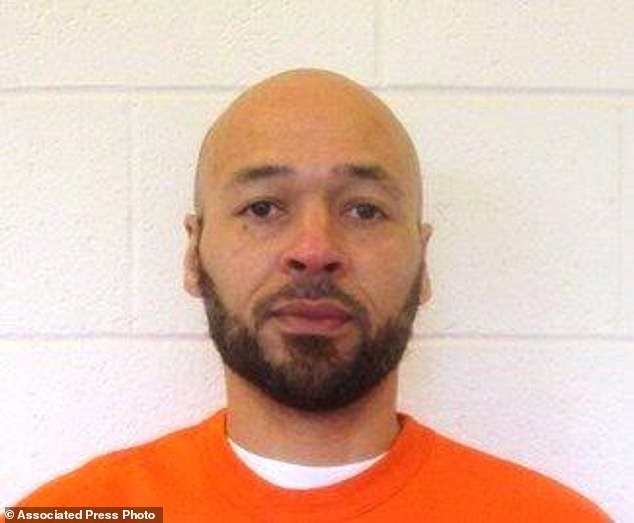
Tremane Wood, 46, was just moments away from dying of lethal injection when he was granted clemency on Thursday
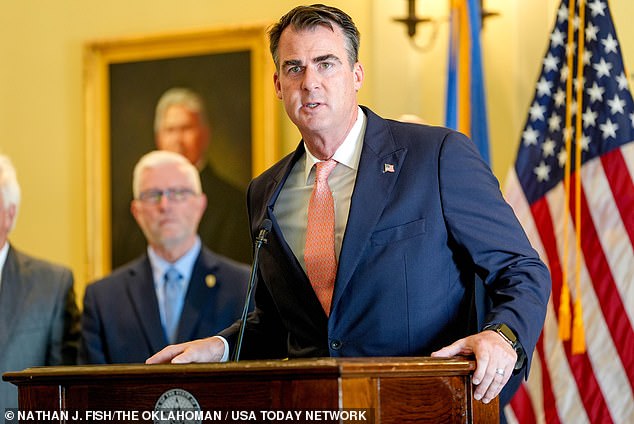
Oklahoma Governor Kevin Stitt (pictured) commuted Wood’s sentence to life in prison without the possibility of parole at the last minute
At the time of his death Wipf – who grew up in a Montana colony of pacifist Christians known as Hutterites – was doing work with a crew at farms in Oklahoma and Texas.
He and another Hutterite, Arnold Kleinsasser, decided to celebrate New Year’s Eve at a brewery in Oklahoma City and met up with others in their harvest group.
There, the two men met two women – and the four left around 2am to go to a Ramada Inn for sex, but it wound up being a set up.
At the motel, the women pretended they were prostitutes and said they had to be paid first. After Kleinsasser paid them $210, authorities say Tremane and his brother Zjaiton ‘Jake’ Wood busted into the room wearing ski masks and trench coats.
A struggle then ensued, and Wipf was stabbed in the heart.
For years, attorneys for the state have maintained that the evidence ‘overwhelmingly’ established that Tremane was the one who stabbed the victim, as his attorneys argued that his brother wrestled the knife from him and was the actual murderer.
Zjaiton even admitted to the crime as a defense witness at Tremane’s trial – and even though he was convicted of first-degree murder and sentenced to life in prison without the possibility of parole, a jury also found Tremane guilty of first degree murder.
Still, Tremane insisted to the Oklahoma Pardon and Parole Board: ‘I´m not a monster. I´m not a killer. I never was and I never have been,’ Wood said, adding that he regrets his role ‘in everything that happened that night.’
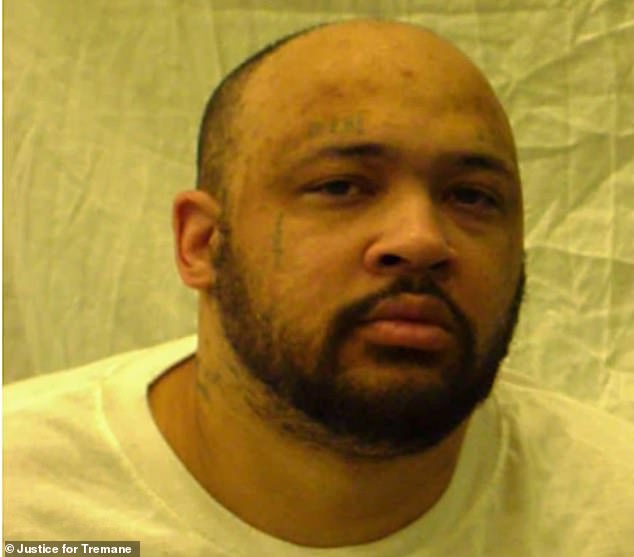
Wood and his attorneys have maintained that he was not the one who stabbed 19-year-old Ronnie Wipf, and that it was actually his brother, Zjaiton ‘Jake’ Wood (pictured)
His attorneys argued that trial prosecutors improperly concealed from jurors the benefits that witnesses received in exchange for their testimony, and noted that his court-appointed lawyer admitted to drinking and using cocaine during the trial, KFOR reports.
The lawyer, whose license was eventually suspended, had two other clients on death row at the same time – and those cases were retried with both defendants getting off death row, the defense team argued at a hearing before the Oklahoma Pardon and Parole Board.
Wood, who testified to the panel via video link from the Oklahoma State Penitentiary in McAlester, accepted responsibility for his prison misconduct and his participation in the robbery, but denied being the one who killed Wipf.
They were helped in their motion for clemency by Wipf’s family and Kleinsasser, who argued that Tremane should be spared on religious grounds.
‘Being a Christian, I would be totally against it,’ Kleinsasser previously told the Huffington Post. ‘I look at it from a perspective of how much I’ve been forgiven from God. And that’s the same forgiveness I’m called to extend.
‘There’s things that we’re all capable of doing, following our fallen nature,’ he continued.
Wipf’s mother, Barbara, also argued: ‘They should let him live.’
Attorney General Gentner Drummond said that the state respects their religious beliefs, but pushed for the execution to move forward anyway.
‘If ever there was a case that demonstrates society’s interests can diverge from the preferences of victims, it is this one,’ he argued to the Oklahoma Pardon and Parole Board.
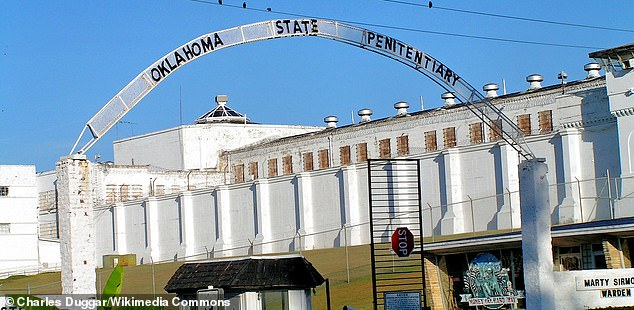
Wood had received a last meal and was brought into the execution chamber at the Oklahoma State Penitentiary when the governor made his announcement
He and other prosecutors went on to paint Wood as a dangerous criminal who continued to participate in gang activity and commit crimes while in prison, including buying and selling drugs, using contraband cellphones and ordering attacks on other inmates.
‘Even within the confines of maximum security prison, Tremane Wood has continued to manipulate, exploit and harm others,’ the attorney general argued, claiming that ‘no prison and no prison cell can protect society from his evil and ongoing deeds.’
The Pardon and Parole Board ultimately voted 3-2 last week to recommend that the governor grant clemency, with two of those who voted in favor of Wood’s clemency agreeing that his court-ordered lawyer had done a poor job at his 2004 trial.
Wood´s attorneys had asked the U.S. Supreme Court to stop the execution on these grounds, but were denied just hours before Stitt announced his decision.
As the state prepared for his execution, Wood received a ‘last meal’ and had been moved to a cell next to the death chamber.
He had not yet been strapped to the gurney when the governor made his decision, said prison spokeswoman Kay Thompson.
‘My stomach still hurts,’ Jasmine Brown-Jutras, a community organizer and advocate for the Wood family, told the Guardian of the stress she felt at that moment. ‘It was really scary and it’s really traumatizing.
‘All of the tears that I’ve had over the last weeks are not in despair that we won’t have Tremane any more, it’s sadness for what trauma the legal team has been through,’ she continued, thanking God for his stay of execution.
Wood’s son, Brendan Wood, also told the outlet he felt ‘very joyous’ by the news.
‘I feel lighter. I feel like a thousand pounds has been lifted off my shoulders.’
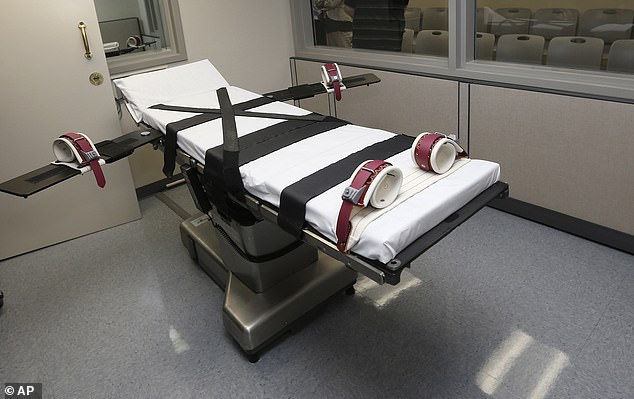
Wood had not yet been strapped into a gurney like the one pictured when his life was spared
But he, too, was upset about how close his father came to dying.
‘I think there needs to be possibly some precaution in place, maybe even a bill that prevents last-second decisions like this,’ Brendan argued.
‘I believe that a person wholeheartedly thinking that they are about to take their last breath, and it’s coming down to second, minutes before the decision is made… I find that to be mental torture, I don’t find that to be humane… because at that point they are trying to find their peace and find a place where they aren’t going to go out in anguish.’
Meanwhile, Drummond expressed his outrage at the decision.
‘I am disappointed that the governor has granted clemency for this dangerous murderer, but respect that this was his decision to make,’ he said in a statement.
George Burnett, one of the original prosecutors, also said he is concerned that a five-member parole board can have such a profound impact on a case that has been litigated for more than 20 years.
‘Ronnie Wipf is buried on a lonely hill somewhere on the plains of Montana, and when his family visits him, they wonder what might have been,’ Burnett said.

